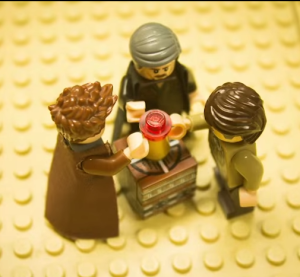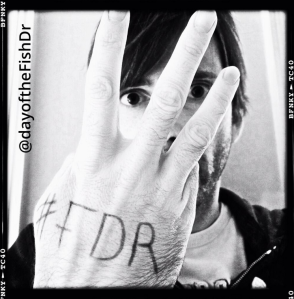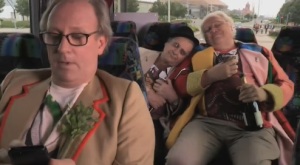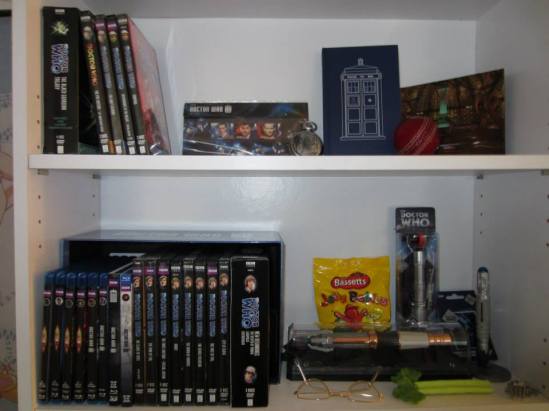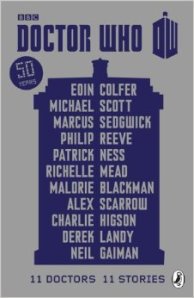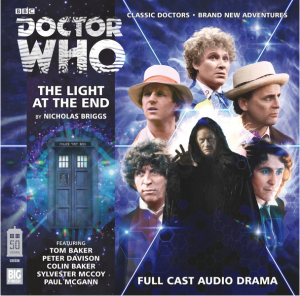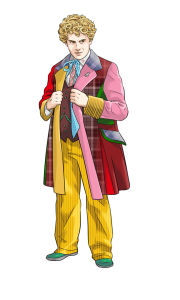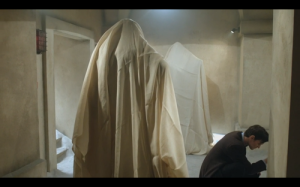The Destiny of the Doctor is a series of eleven audiobooks produced by Big Finish and AudioGo as part of the 50th anniversary celebrations. One book for each Doctor, they were published from January, 2013 to November, 2013, one book a month. Each book is read by an actor or actress who played one of that Doctor’s companions, except for “Night of the Whisper” which was read by Nicholas Briggs, and features a second performer playing an important guest role. The books in the series are listed below.
- Hunters of Earth, read by Carole Ann Ford (Susan Foreman)
- Shadow of Death, read by Frazer Hines (Jamie McCrimmon)
- Vengeance of the Stones, read by Richard Franklin (Mike Yates)
- Babblesphere, read by Lalla Ward (Romana)
- Smoke and Mirrors, read by Janet Fielding (Tegan Jovanka)
- Trouble in Paradise, read by Nicola Bryant (Peri Brown)
- Shockwave, read by Sophie Aldred (Ace McShane)
- Enemy Aliens, read by India Fisher (Charley Pollard)
- Night of the Whisper, read by Nicholas Briggs
- Death’s Deal, read by Catherine Tate (Donna Noble)
- The Time Machine, read by Jenna Coleman (Clara Oswald)
Each book is a self-contained adventure, but they are all linked together by the appearance of the Eleventh Doctor in all of them, contacting his previous incarnations to ask them to do something for him. In most cases, it’s a seemingly simple task such as, “Make sure this object doesn’t get destroyed.” Of course, much of the time, the message gets to the Doctor just before the object is about to be destroyed, so the Doctor must figure out how to prevent it. Even though the adventures are fun in and of themselves, the introduction of this plot point makes you want to keep reading the series, to find out what other things the Doctor needs done and why he needs them. (The realization of this was a bit jarring for me. I bought the entire series of books at once, then listened to the Doctors I was most interested in, namely the Tenth Doctor and the Fifth Doctor. The appearances of the Eleventh Doctor were fun, but I didn’t pay much attention to them. Then I listened to the Eleventh Doctor’s book, and at some point, he started talking about all the things he had asked his previous incarnations to do, and I smacked myself in the forehead and stopped listening to it, so that I could go back and listen to the other ten first. Sigh.)
Looking over the series as a whole, I enjoyed it very much: the adventures are fun in and of themselves. Some are better than others (my particular favorites are Babblesphere, Shockwave, Night of the Whisper, and Death’s Deal), but all of them are good. All of the performances by the readers and the guest actors were great, and if all audiobooks have performances of this quality, I’d buy and listen to more. (I’ve been told by more experienced audiobook listeners that quality varies quite a bit. Maybe these are great because all of the readers are experienced actors and very familiar with the universe? I don’t know.)
Reviews of the individual eleven novels below. I’ve included an intro for each novel, and spoilers are pretty minimal.
Hunters of Earth, by Nigel Robinson. Read by Carole Ann Ford, featuring the First Doctor and Susan Foreman
Early in the time that the Doctor and Susan spent on Earth, Susan is having problems fitting in and finding friends. A boy in her class named Cedric tries to help her fit in by doing things with her and listening to the Beatles with her, but her other classmates begin to turn on her as if controlled by something, attacking her physically and yelling, “Aliens get out!” She and the Doctor must figure out what’s causing all of this.
This is an interesting exploration of the difficulties a normal teenager has with finding her place among her peers, not even considering an alien teenager. As the danger begins to grow, the story does a great job of dropping hints as to what physically is causing the violent attacks without explaining who or why, letting you solve the mystery along with the Doctor. The mysterious Mr. Rook, a teacher at the school, throws a spanner into the situation, and you’re not quite sure what side he’s on.
I will say, though, that this book is completely worth reading for the sole purpose of listening to Ms. Ford. As I stated above, she reads the book and plays all of the character voices except for Cedric, who is played by the guest actor. This means you hear her reading the novel as well as playing Susan, the Doctor, Mr. Rook, and other minor characters, and she is superb. Ms. Ford was at least seventy-two at the time of the recording, and you can tell that from her normal reading voice, but when she plays Susan, she sounds like a teenager. Then she effortlessly switches into the stuffy, slightly offended cadence of the First Doctor – she was amazing as the Doctor! And then, as Mr. Rook, her formal, disdainful drawl is perfect. I’ve listened to all of the novels, and in my opinion, none of the readers is as perfect and talented as she is.
Shadow of Death, by Simon Guerrier. Read by Frazer Hines, featuring the Second Doctor, Jamie McCrimmon, and Zoe Heriot
The Doctor, Zoe, and Jamie land on a planet which inexplicably exists orbiting a pulsar. A human expedition has landed here to investigate the ruins of a city on this planet, to try to figure out who built it and how they managed to survive. The extraordinary effects of the pulsar has caused time pockets on the planet, and so the members of the expedition are trapped in time zones that run at different rates, and meanwhile, a strange shadow is hunting people down and killing them.
This is one of the most interesting of the books because of the time games it plays, with areas of time running far faster than others (for example, standing in one time zone, the characters see other characters in a different time zone that are acting normally but look like statues). Because of this, everything is very mysterious until the Doctor figures out what’s going on, and in this case, he’s really the only one who can resolve the situation. There was only one disappointing thing about this audiobook: due to the quality of Mr. Hines’ voice, he sounded far more like Mr. Davison than Mr. Troughton, and it was very difficult to not picture the Fifth Doctor as the Doctor in this book.
Vengeance of the Stones, by Andrew Smith. Read by Richard Franklin, featuring the Third Doctor, Brigadier Alistair Gordon Lethbridge-Stewart, and Lieutenant Mike Yates
During a routine flying exercise, a squad of RAF pilots in Scotland encounter an unidentified energy discharge and one of their planes is lost without a trace. The Brigadier and the Doctor arrive to investigate, seconding Lieutenant Mike Yates, who is very familiar with the area. They find the missing pilot, delirious and walking across the countryside, and follow him to a circle of standing stones. They find that the mysterious phenomenon is linked to the multiple menhir circles scattered around the area.
Getting a bit of backstory on Mike Yates was definitely a treat, but unfortunately, the rest of this story was rather predictable and banal. It wasn’t bad; just average. I did like the ending, as it wasn’t a good, happy, everyone-lives kind of ending.
Babblesphere, by Jonathan Morris. Read by Lalla Ward, featuring the Fourth Doctor and Romana
The Doctor and Romana land on a human colony which was gone to seed. They discover that the colony developed a computerized mindlink technology to help people collaborate with each directly, to become more productive, but they succumbed to the temptation of oversharing, making it compulsory for everyone to join the network so that everyone’s thoughts were broadcast to everyone at all times. The addictive information-sharing crippled the colony, as people stopped working and taking care of themselves as they sought the latest information about everyone else.
This story was Facebook/Twitter gone wild, and while it went a bit beyond the believable sphere, it was a great dystopian portrait of a society destroyed by the thoughtless spread of technology. The book was enhanced by the superb dialogue written for the Doctor and Romana; they were clever and hilarious, perfectly in character with their portrayals on the TV show. A couple of the elements of the story were a bit predictable, but did not detract from the overall enjoyment.
Smoke and Mirrors, by Steve Lyons. Read by Janet Fielding, featuring the Fifth Doctor, Adric, Tegan Jovanka, and Nyssa
The Doctor is summoned to an amusement park in 1920s America, where his friend, Harry Houdini, requests his assistance in investigating some phenomenon he’s been unable to explain rationally: as a stage magician who’s seen things with the Doctor that have always had an explanation, he knows that if he can’t figure it out, it’s likely that it’s caused by something extraterrestrial and may endanger the world. While investigating, the Doctor and Houdini are separated from the other companions, and both groups are attacked.
While there’s plenty to explore and figure out in this story, the real tale here is Houdini’s – him and his relationship with the Doctor – and while it’s interesting, it’s a little too pat. However, there’s lots of danger and running and great problem-solving by both the Doctor and his companions.
Trouble in Paradise, by Nev Fountain. Read by Nicola Bryant, featuring the Sixth Doctor and Peri Brown
Unlike most of the other stories in this series, in this one, the Eleventh Doctor’s message comes at the very beginning, asking the Doctor to obtain an energy source called an omniparadox. His search lands him on the Santa Maria just before Columbus makes landfall at Hispaniola and encounters the natives for the first time. Columbus finds the Doctor and Peri on the ship and assumes that the Doctor is a native chieftain who has somehow snuck on board, and starts trying to figure out how to manipulate this savage into finding gold and treasure for him.
This book reminds me very much of the other Big Finish audios in which the Doctor meets historical figures. Columbus is portrayed in a very over-the-top manner as an ambitious man who’s completely full of himself and jealous of anyone who might be better. I can imagine that if you aren’t used to this type of character in Doctor Who (and I can’t think of any in the modern TV show), this audiobook will be very off-putting. The Doctor’s dealings with Columbus are very enjoyable, but the final conflict was not very interesting and ruined an otherwise fun and campy story.
Shockwave, by James Swallow. Read by Sophie Aldred, featuring the Seventh Doctor and Ace McShane
The Doctor and Ace land on a space station orbiting a human-inhabited planet that is about to get destroyed by a shockwave pulse from its sun. The population of the planet has mostly been evacuated, and there’s only one ship left, the Obscura, and because of the time winds around the star preventing the TARDIS from dematerializing, the Doctor and Ace must flee the star with the rest of the humans.
Unlike the other books, which concerned themselves mostly with the actions and interactions of the characters, this one took the time to describe the planet and its destruction, painting a vivid picture of what was happening and heightening the tension as the ship attempted to outrace the shockwave. Add to this the distrust the humans have for these two people that appeared out of nowhere and have no identification, and the mystery of why the Doctor landed here in the first place, and you’ve got a great story. Ms. Aldred did a fantastic job voicing her Ace, of course, as well as the Scottish rolling Rs of the Doctor.
Enemy Aliens, by Alan Barnes. Read by India Fisher, featuring the Eighth Doctor and Charley Pollard
In 1930s London, the Doctor receives a message from his future self about an etheric disturbance, but the message is cut off, only telling him that William Tell is important. He and Charley investigate the disturbance and discover a sideshow performer named William Tell who claims to have an eidetic memory, but when he performs on stage, he gets his details wrong. When he’s murdered in front of the audience, Charley is blamed and she and the Doctor must clear their names.
An action tale with a pre-war feel and multiple people with different goals, this is a good basic Doctor Who adventure. What I really enjoyed about this particular book, though, was the author’s style. The story is told entirely from Charley’s point of view, and her descriptions and internal monologues are entertaining. She’s human, so she doesn’t think like the Doctor, but she has an unusual style of seeing the world, and she really appealed to me. Time to listen to more of her audios, I think.
Night of the Whisper, by Cavan Scott and Mark Wright. Read by Nicholas Briggs, featuring the Ninth Doctor, Rose Tyler, and Captain Jack Harkness
On a planet called New Vegas, run by a businessman (read: mob boss) by the name of Wolfsbane, the Doctor, Rose, and Jack investigate the corruption of the world, as well as the sudden appearance of a vigilante called the Whisper who seems bent on bringing justice (read: death) to all evildoers.
I really enjoyed this story. It begins with a nice pulp fiction, dime-store detective novel feel, but by the end, it’s back in familiar Doctor Who territory, exploring the gray areas of evil, crime, and justice. Along the way, there’s plenty of action and comedy.
The thing that really made it, though, was Mr. Briggs’ portrayal of the Ninth Doctor. You might recognize him as the guy that voices the Daleks and the Cybermen (and other monsters) throughout the run of the modern show, but he’s been working as an actor and writer on Doctor Who properties since the 1980s, and has directed a number of Big Finish audios. His impersonation of the Ninth Doctor was, to overuse a particular word, fantastic. It was a delight to hear the Ninth Doctor (who is to me the rarest Doctor, the one we’ve seen the least of) again, and I was completely enthralled. If the BBC ever lets Big Finish do Ninth Doctor audios with a different actor (because we all know Mr. Eccleston won’t do it), Mr. Briggs will certainly be able to carry that torch.
Death’s Deal, by Darren Jones. Read by Catherine Tate, featuring the Tenth Doctor and Donna Noble
The Doctor and Donna follow a distress signal to a planet called Death’s Deal, which has the reputation of being the deadliest planet in the universe. Soon after being joined by a group of thrillseeking sightseers who pay for the ability to claim that they’ve touched down on the surface of the planet and survived, the tourists’ ship and the TARDIS are swallowed by huge monsters that burst out of the ground. The Doctor must keep everyone alive while trying to locate the TARDIS.
While this is not the most complex of the novels, it’s full of action and vivid descriptions of this violent and rather inexplicable world – after all, how could an ecosystem of organisms completely bent on destroying everything around them, including each other, actually survive? The characterizations and dialogue were spot-on, and I really enjoyed this book, particularly because both the Doctor and Donna were perfectly written.
The Time Machine, by Matt Fitton. Read by Jenna Coleman, featuring the Eleventh Doctor
The Doctor visits Oxford University in 2013 to investigate a professor who is building an actual working time machine, centuries before humans discover time travel.
I’m not writing any more of a teaser, because it’ll just give away the plot. We know from the previous books that the Eleventh Doctor is up against something very dangerous and enlists the help of his previous incarnations to defeat it, and the tie-together is pretty incredible, and if you’ve made it this far through the audiobooks, you don’t want to miss this. However, the lead-in is pretty straightforward, and if you’re wondering if this book is worth it if you haven’t listened to the previous books, I’d have to say, probably not: the cool thing about this story is how all the rest of the books led up to it.
Ms. Coleman does a great job of playing the Doctor: while she’s not particularly convincing (and that’s no insult to her: I’d say very few people could play Mr. Smith’s Doctor well), she still captures his eccentricity and enthusiasm. I think she did the Eleventh Doctor’s voice through all of the books, because they all sounded the same.

